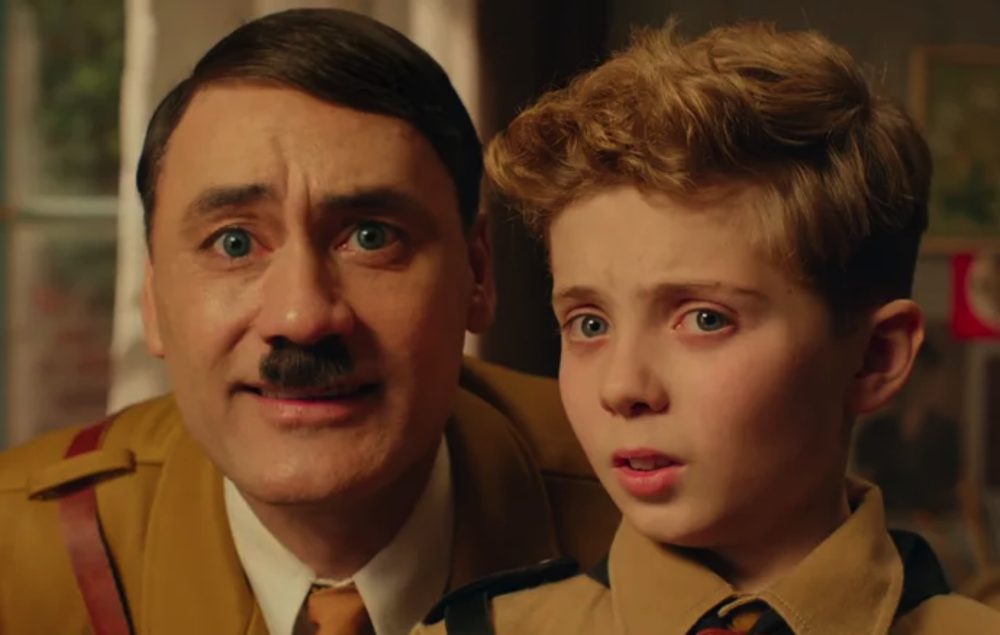
Taika Watiti is a master of ‘happy / sad’ cinema. From Boy to the brilliant Hunt for the Wilderpeople, he manages to combine scenes that are incredibly funny and daft with moments of heart and sincerity that create one of the most distinctive styles in Hollywood right now. Jojo Rabbit is his most ambitious attempt at achieving that tone yet. There are very few directors who could make a satire about Nazi Germany work. But Taika just does.
10 year old, Nazi fanatic Johannes ‘Jojo’ Betzler (Griffin Davis) wants nothing more than to be accepted into the Nazi guard and impress his Fuhrer. But when he discovers his mother (Johansson) has been hiding a young Jewish girl (McKenzie) in their house, Jojo starts to reassess all that he thinks he knows.
Any film billing itself as an ‘anti-hate satire’ obviously has to be funny, and Jojo Rabbit passes this test with flying colours. The challenge of finding anything to laugh about in a war-torn, Nazi occupied Germany is a huge one, but it feels like Taika relishes in that challenge and he flexes his genius comedic brain to great effect. The writing and set up of the gags is top notch. This film isn’t afraid to get political and takes plenty at jabs at the ludicrous beliefs and rules of the Nazi regime. One of the most effective vehicles for this is Taika’s role as Jojo’s imaginary friend, who just so happens to be a 10 year old’s idea of Adolf Hitler. Taika plays it with a knowing wink, showing glimpses of power and terror, before stripping them back to reveal the true petulance and bigotry. It’s baffling to describe the presence of Hitler on screen as crowd pleasing, but there is so much entertainment to be found in the complete mockery.
But whilst there is a political edge to the satire, it isn’t the focus. Even at the height of the regime, there were many people living in Germany who weren’t Nazis, and the film is eager to remind you of this. There’s a shift towards the end that makes the horrors of the government’s abandonment of the people and the realities of sending boys into war become shockingly apparent. As much fun as there is to be had, one of the most apparent emotions of this film is empathy.
Jojo Rabbit is full of great performances. Scarlett Johansson continues her incredible year with a tender and soothing turn as Jojo’s mother, trying to prevent her son from growing up too fast in a world that he doesn’t understand. Sam Rockwell continues to just quietly smash every role he plays. Stephan Merchant is surprisingly scary and menacing as a Gestapo agent. Adorable youngster Archie Yates is extremely charming as Jojo’s best friend Yorki.
But the two stars are Thomasin McKenzie and newcomer Roman Griffin Davis. The relationship is crucial to the impact and success of this film and they are both fantastic. McKenzie more than delivers on the promise of Leave No Trace. Her Elsa is steely and resilient from a life of discrimination and is in complete control of Jojo for much of the film. But as their friendship starts to flourish, she opens up to a moving and nuanced performance. There is so much resting of Davis’ shoulders, but he completely thrives. He’s always likeable, even in moments when he does bad things. He’s cheeky and playful, whilst also selling the moments of vulnerability and emotion. This kid is going to go far. The arc of Jojo is so well crafted, transitioning from him being scared of Elsa because of her faith and instead fearing her because she is the most terrifying thing in the world to a 10 year old boy – a girl he likes.
Jojo Rabbit treads the line between it’s differing tones perfectly. It’s very, very funny, but it never loses sight of the harsh realities of its subject matter nor the emotional heart of the human story at its centre. Another Watiti gem!
9/10
***Please be sure to follow me on Twitter (@archiewmarshall) and Letterboxd (theboymarshall) for more film related fun.